Arado y sembramos
 The whip fell with a resounding snap, momentarily lifting a snatch of fur along the steer’s rump. Bellowing at his tormentor, the steer obeyed the whip as its sting caused his hooves to bite deep in the dry, alkaline ground. The plow jerked ahead a foot or so. Roberto’s calloused hands deftly
The whip fell with a resounding snap, momentarily lifting a snatch of fur along the steer’s rump. Bellowing at his tormentor, the steer obeyed the whip as its sting caused his hooves to bite deep in the dry, alkaline ground. The plow jerked ahead a foot or so. Roberto’s calloused hands deftly manipulated the swiveling handle of the wooden plow, turning it to maintain a straight line across the broad, dusty field. His wife and mamá waded through the newly turned soil behind him, their rubber boots sinking deep into the fresh earth. They skillfully tossed corn kernels in the rows created by the plow. As the two women passed over the rows, their feet tamped the seeds deep into the ground. There, the kernels would wait for the life creating rains to cause them to spring into action, forcing their heads above the soil as tiny green shoots.
manipulated the swiveling handle of the wooden plow, turning it to maintain a straight line across the broad, dusty field. His wife and mamá waded through the newly turned soil behind him, their rubber boots sinking deep into the fresh earth. They skillfully tossed corn kernels in the rows created by the plow. As the two women passed over the rows, their feet tamped the seeds deep into the ground. There, the kernels would wait for the life creating rains to cause them to spring into action, forcing their heads above the soil as tiny green shoots.
The equatorial sun relentlessly beat down on the parched ground to no avail. The earth had been robbed of its last bit of moisture over a month ago. But, that is often the way of the weather in the highlands of southern Ecuador. Like the Morton Salt Girl and her simple slogan, “When It Rains, It Pours!”, dry spells are often followed by meaningful rainfall, sometimes torrential, pushing rivers and brooks out of their rocky stream-beds. Soon enough, or so everyone hoped, the rains would arrive. Once the billowing clouds knit themselves together into threatening black shapes, the skies would open, releasing their nurturing droplets. Almost overnight, the parched landscape would be transformed into a verdant carpet of mixed hues of green, indicative of the sheer variety of flora bursting forth.
Colorful pink and green bags of not so composted manure dot another nearby field. Within a week, the 50-kilo bags will be dispersed evenly over the dry earth before being slashed open and their contents cut into the hungry and overused soil. The fertilizer does its job, replenishing the nutrients used by the last season’s crop. Nearby, in the deeper shade of a stand of eucalyptus, a spare plow yoke for the steers leans against a gnarled trunk. As my telephoto lens pans over the area, I see that it is broken and in need of repair. Remnants of the bright red cloth often used to bind the steers horns to the yoke waft lazily as a slight breeze passes through the stand of trees. A campesino siestas in the shade taking, a well earned respite from the hard chores of country life.
And, so it is during the time for planting in the local highlands. A scene that has been played out for countless generations on the stage of life as families cultivate corn. Choclo, a mainstay of the table and an important part of the Ecuatoriano diet, prepared in various forms. Corn is also the heritage of the agrarian peoples in this area of South America.
I live 90 feet up in the sky, in El Centro, about a block and a half from Parque Calderon. Our big bays of slider windows afford us a marvelous view of Cuenca. And, guess what? There are numerous small stands of corn cultivated on rooftops in Centro. Five floors up, there are twenty corn plants in a small plot. They wave their green stalks and tasseled heads in the light winds of the basin. I laugh out loud about things like this. They make me feel good.
Yes, it’s these slices of the pie of Ecuadorian life, including their vestiges of crust, that I enjoy seeing and serving up fresh. I use my lens as a knife, to carve out a healthy sized portion. Then, my pen serves it to you on the plate of discovery. I don’t want anyone leaving hungry; pie is meant to be enjoyed! Now you know a part of what’s going on in the lives of all the Roberto’s, their esposas and mamás of the countryside, high in the Andes and overlooking Cuenca.






















